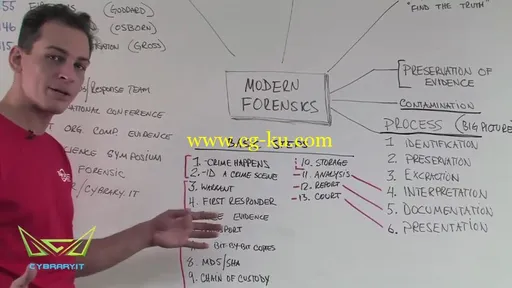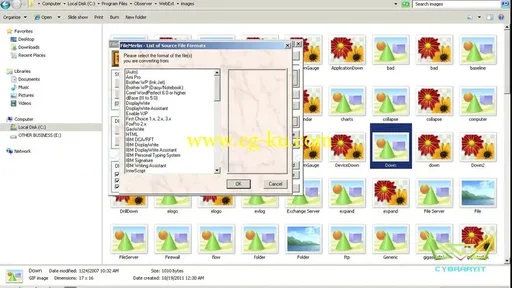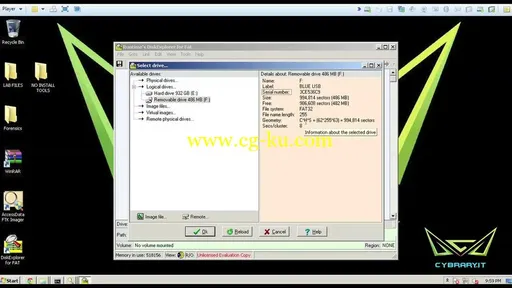
Cybrary - Computer and Hacking Forensics
English | mp4 | H264 1280x720 | AAC 2 ch | 7 hrs 8 min | 2.24 GB
eLearning
Digital crime is more prevalent than ever, and the attacks are getting highly complex. Security software can’t pinpoint it—the eyes and expertise of a trained professional is necessary. Our free online Computer and Hacking Forensics training teaches you how to become that professional. Love the idea of digital investigation? That’s what computer forensics is all about. You’ll learn how to determine potential online criminal activity at its inception, how to gather legal evidence, how to search and how to investigate wireless attacks. Additional topics include unlocking passwords, the establishment and maintenance of a physical “chain of custody” and recovering lost and deleted data. At the conclusion, you will have been taught the concepts included in the industry leading EC-Council CHFI certification exam.

Progress is a nice word. But change is its motivator. And change has its enemies.” – Robert Kennedy
Undoubtedly, moving to change Cyber Security training from paid-to-free will bring forth enemies, but it is a right that the world should share. Learning and knowledge should be free and we’re serious about progress, and we’re serious about change.
Cyber crime is one the fastest-growing criminal activities today, and the world needs more people who are capable of solving digital crimes. Learn how to do so with this completely free, in-depth self-paced, computer forensics training course.
Online Computer and Hacking Forensics Training
Digital crime is more prevalent than ever, and the attacks are getting highly complex. Security software can’t pinpoint it—the eyes and expertise of a trained professional is necessary. Our free online Computer and Hacking Forensics training teaches you how to become that professional. Love the idea of digital investigation? That’s what computer forensics is all about. You’ll learn how to determine potential online criminal activity at its inception, how to gather legal evidence, how to search and how to investigate wireless attacks. Additional topics include unlocking passwords, the establishment and maintenance of a physical “chain of custody” and recovering lost and deleted data. At the conclusion, you will have been taught the concepts included in the industry leading EC-Council CHFI certification exam.

CHFI Course Specs:
- CEU / CPE: 10
- Total Clock Hours: 7 hrs, 8 mins
- Get a Certificate of Completion
Materials Used:
- VMWare Player (or other Virtual App)
- Generic Windows OS
- CEH toolkits
- Kali OS
*Other specific tools used in the videos are listed in each video’s title.
If you enjoy this course, be sure to check out the Ethical Hacking class next, always free at Cybrary.
This course sponsored by: @thecode
About the EC-Council CHFI Certification Exam
In order to earn the official CHFI certification, you must take one required exam. Test-takers must score at least 70 percent on the 150-question exam. The exam can be taken globally, at any VUE or Prometric test center.
Certifications are valid for three years. Reestablishing your certification status requires certain guidelines be met. For more information on maintaining the CHFI certification, visit EC-Council’s website.
Do you know someone who could benefit from this online computer forensics training class? Email them an invite and they can join you, and you earn cybytes!
Get Started with this Class:
1) Download any relevant course materials from the "Recommended Additional Study Materials" section.
2) Watch the videos below, in order.
3) Blend the online videos with one or more of the recommended study materials on the right hand side of this page.
4) Take notes and study hard.
Introduction
Contents:
Module 1 - Modern Forensics
Module 2 - Investigative Process
Module 3 - Searching and Seizing
Module 4 – Digital Evidence
Module 5 – First Responder
Module 6 – Computer Forensics Labs
Module 7 – Hard Disks and File Systems
Module 8 – Windows Forensics
Module 9 – Data Acquisition
Module 10 – Recovering and Deleting Files
Module 11 – Access Data
Module 12 – Image Files
Module 13 – Steganography
Module 14 – Application Password Checkers
Module 15 –Log Capturing and Event Correlation
Exam Module
